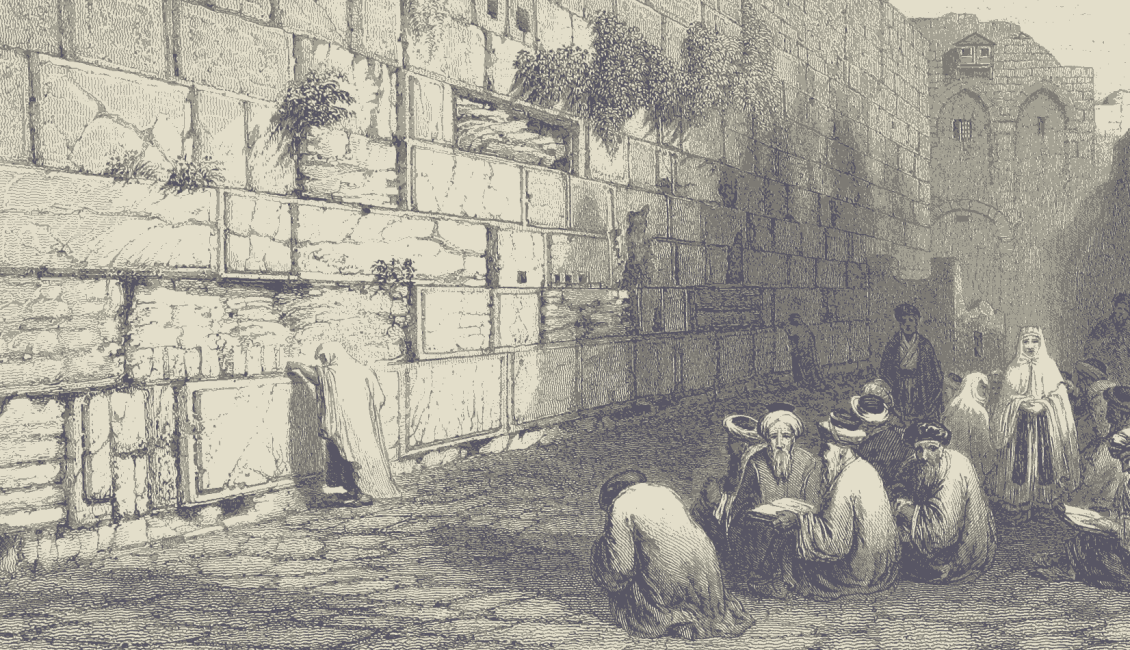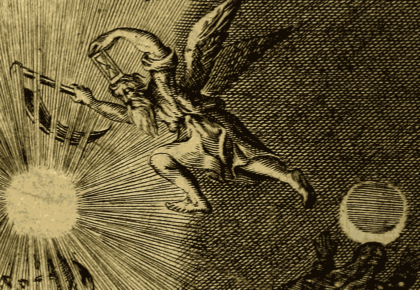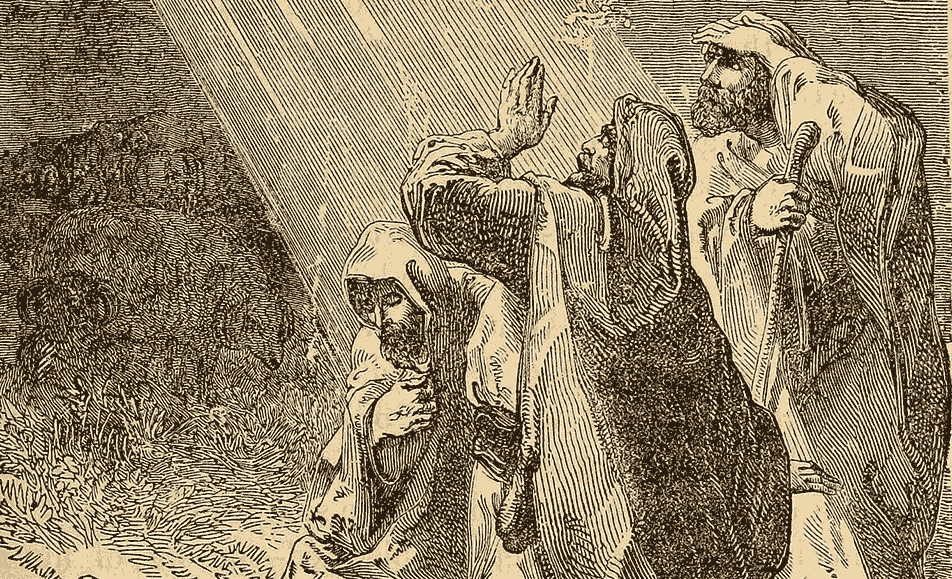
After a discussion I had with my brother about the nature of Torah study (is it merely an intellectual exercise or something more?) I started wondering about the following issue after he quoted a relevant point related to Tisha be’Av, which was yesterday and is the day commemorating the destruction of both temples, among other events. Many are aware of the famous statement in B. Nedarim 81a that the first temple was destroyed because the people did not recite the blessing required before studying Torah. This point was taken up and featured heavily in the work of many commentators on the Talmud and legal scholars, e.g. Rabbeinu Yonah, Ran and Shulchan Aruch.
To be more precise, in the above text the famous dictum is stated by Rabbi Yehudah in Rav’s name with respect to the verses in Jeremiah 9: 11-13.
9. I will take up weeping and wailing for the mountains, and a lamentation for the dwellings of the wilderness, because they are withered and without any one passing through, and the lowing of the cattle is not heard; both the fowl of the heavens and the beast have fled and are gone. |
With regard to how my question relates to Ritva and Ran, here are the relevant quotes from Ritva and Ran regarding what happened at Sinai.
Ritva: BT Eruvin 13b. Translation is from Rosensweig (1992).
When Moshe ascended to receive the Torah, it was demonstrated to him that every matter was subject to forty-nine lenient and forty-nine stringent approaches. When he queried about this, God responded that the scholars of each generation were given the authority to decide among these perspectives in order to establish the normative halakha
Ran: Derashot Haran, Derush 7.
But this matter requires investigation. How can we say that [the views of] two groups of disputants were told to Moshe by the Almighty? … How can we say that something untrue left the mouth of God? But this is the [correct] account: It is well known that the entire Torah, written and oral, was given to Moshe at Sinai, as it says in BT Megila (19b) ‘R. Hiya bar Abba said in the name of R. Yohanan: What does the verse mean “And on them as all the words…”? This teaches that the Almighty showed Moshe dikduke Torah and dikduke Soferim…’ Dikduke Soferim are the disputes and differing rationales among the Sages of Israel, and all of them Moshe learned from the mouth of the Almighty without a decision [one way or the other]…since the [authority to make a] decision was given over to the sages of each generation…and we are enjoined to follow their decision, whether they have arrived at the truth or its opposite…whatever they decide, that is what God has commanded.
Dani




Ludwig Wittgenstein makes some comments on what it is to believe that something is a divine punishment, which seem relevant here… I hope this helps!
Wittgenstein in a lecture (from student notes): “Suppose you had two people, and one of them, when he had to decide which course to take, thought of retribution, and the other did not. One person might, for instance, be inclined to take everything that happened to him as a reward or punishment, and another person doesn't think of this at all. / If he is ill, he may think: ‘What have I done to deserve this?’ This is one way of thinking of retribution. Another way is, he thinks in a general way whenever he is ashamed of himself: ‘This will be punished.’ / Take two people, one of whom talks of his behaviour and of what happens to him in terms of retribution, the other one does not. These people think entirely differently. Yet, so far, you can't say they believe different things. / Suppose someone is ill and he says: "This is a punishment," and I say: "If I'm ill, I don't think of punishment at all." If you say: "Do you believe the opposite?" — you can call it believing the opposite, but it is entirely different from what we would normally call believing the opposite. / I think differently, in a different way. I say different things to myself. I have different pictures. / It is this way: if someone said: "Wittgenstein, you don't take illness as punishment, so what do you believe?" — I'd say: "I don't have any thoughts of punishment." / There are, for instance, these entirely different ways of thinking first of all — which needn't be expressed by one person saying one thing, another person another thing.” (Ludwig Wittgenstein, ‘Lectures on Religious Belief’, in Cyril Barrett (ed) *Lectures and Conversations on Aesthetics, Psychology, and Religious Belief*, pp. 54-5)
A conversation with Wittgenstein (from notes by the interlocutor): “Somehow – I can’t remember quite how – the conversation came round again to talk about the Bible. / DRURY: ‘There are some passages in the Old Testament that I find very offensive. For instance, the story where some children mock Elisha for his baldness: ‘Go up, thou bald head’. And God sends bears out of the forest to eat them.’ / WITTGESNETIN: (very sternly) ‘You mustn’t pick and choose just what you want in that way.’ / DRURY: ‘But I have never been able to do anything else.’ / WITTGENSTEIN: ‘Just remember what the Old Testament meant to a man like Kierkegaard. After all, children have been killed by bears.’ / DRURY: ‘Yes, but we ought to think that such a tragedy is a direct punishment from God for a particular act of wickedness. In the New Testament we are told the precise opposite – the men on whom the Tower of Siloam fell were not more wicked than anyone else.’ / WITTGENSTEIN: ‘That has nothing to do with what I am talking about. You don’t understand, you are quite out of your depth.’ / I did not know how to reply to this. It seemed to me that the conversation was distasteful to him, and I did not say anything further. / After a pause we began to talk about more trivial matters. When the time came for me to go to the station, Wittgenstein insisted on coming with me although I tried to persuade him he should not do anything to tire himself. On the way to the station he suddenly referred to our dispute over the Old Testament. / WITTGESTEIN: ‘I must write you a letter about that’. / Just before the train pulled out he said to me, ‘Drury, whatever becomes of you, don’t stop thinking.’ These were the last words I ever heard from him.” (Maurice O’Conner Drury, ‘Conversations with Wittgenstein’, in Rush Rhees (ed.), *Ludwig Wittgenstein: Personal Recollections*, pp. 152-3)
Lovely quotes Gabriel. Thanks for them.
Dani, I think that the questions your asking, despite my bias (in fact because of my bias) that these are emphatically not empirical claims, are in the vicinity of what I take to be the most pressing question for 'Jewish philosophy' (whatever that means). Namely:
If the primary purpose of (some of) the seemingly empirical/historical passages of the Bible and the Talmud are NOT actually about getting the empirical/historical facts straight, then what IS their primary purpose?
Then, more importantly, how do these narrative sections of Jewish literatrue do their job better than via some other method?
What are the inner mechanics, so to speak, of narrative. What does it do? How does it do it? And why is it important?
We have a body of ostensibily legal literature in the Bible and the Talmud that is constantly intermingled with narrative sections. Why?
As I say, I take this question to be of central importance. Then we'll be better placed to discuss Yehuda's question about the Exodus narrative; we'll be better placed to understand the significance of Rav's claim about the temple, and we'll be better placed to talk about belief in the words of the sages.
What, for instance, is the role of a national narrative, more generally, in the formation and sustenance of a national identity? How does it differ from a national history?